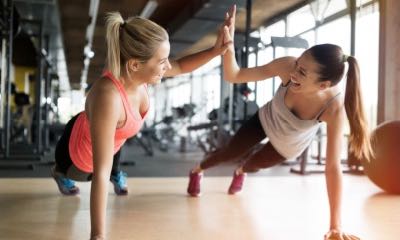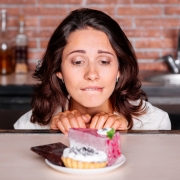Harness the Power of Peer Pressure for Your Health
Humans crave companionship and camaraderie. That’s why social health is one of your pillars of overall health. And friends are great and important. But being a social animal has drawbacks—more than just the social pressure to go to that party you’d rather skip. Peer pressure can create or reinforce unhealthy habits and behaviors.
That’s right. Peer pressure doesn’t stop existing when you get older. The connections it has to health are important throughout your life. It extends from avoiding the wrong crowd as a teen to finding your tribe of healthy friends as an adult.
Studies have found that teens and adolescents crave acceptance from their peers more than adults. These social pressures produce big emotions in teens that can alter decision-making.
The good news is that people generally get better at dealing with or rejecting peer pressure as they age. But the resistance doesn’t change much between 18 and 30. And research is also uncovering interesting connections between adult peer pressure and health.
A study of adult Australian women found strong connections between health and peer pressure. It showed how much of an impact social norms and support can have on diet and exercise. The results suggested that women who are around healthy people were more likely to exhibit healthier behaviors in diet and activity.
These connections between social pressures and health holds true in the smallest group, too—married people. Studies have consistently found partners who make healthy choices together have more success in sticking with them. But being married also correlates with weight gain.
So, maybe the focus for adults shouldn’t be avoiding peer pressure. Instead, you should seek out or create situations where positive peer pressure can work in your favor.
This is probably most important in diet and physical activity—two areas that have wide-ranging impacts on health. So, let’s take a look at two scenarios where peer pressure and health intersect, focusing first on food choices and then on activity levels.
The Why and How of Peer Pressure and Diet

You already know how important it is to eat a healthy diet. The kind that provides a balance of whole grains, healthy fats, fiber, and plenty of protein. But it’s not always easy.
Some of that difficulty could stem from what people are eating around you. It’s much harder to stick to salad when others are indulging in delicious treats. Willpower only goes so far.
But the opposite scenario is also true—when you are around healthy eaters, you feel pressure to do the same. That’s the positive side of peer pressure. And it’s backed up by more than intuition or experience.
Science supports the fact that healthy eating is contagious. One review from the University of Liverpool—which analyzed 15 studies—says these kind of healthy eating behaviors are “transmitted socially.” This was done through the dissemination of eating norms to participants. And the researchers suggest using this positive peer pressure to change behaviors around healthy eating.
Basically, what your peers—friends, family, or coworkers—are choosing impacts what you choose. If you’re around big eaters choosing high-calorie, high-fat foods, your choices may follow suit. But the power of social norms and peer pressure make it less likely you order the fries when everybody gets a salad.
You want to be part of the group and identified as normal. In fact, you don’t even have to see these behaviors from your peers. Simply viewing the social norm in one way—healthy or unhealthy—is likely enough to push you in one direction.
How can you use this to your advantage?
Start by thinking differently and asking questions. You might be bombarded with ads for fast food and unhealthy foods. That can make you think those foods are what normal people eat. Change your perspective by focusing on the healthy options people choose around you. Even ask your friends what their daily diet looks like. It’s probably healthier overall than the choices they might make at a party or restaurant.
This shift in perspective might be enough to nudge you toward the healthy option for dinner. That’s something you can build on to cement healthy habits.
But if that isn’t enough, you may have to flip the switch yourself. That means creating the positive peer pressure you’d like to see in your group of friends. When you have the option, choose healthy. It’s your turn to host the dinner party, so opt for a plant-based meal. After a while you might see these healthy-eating choices reflected back.
Now you know how peer pressure affects diet. Use it to your benefit and steer the social norms of your peer group toward healthy behaviors.
How Activity is Affected by Peer Pressure
Physical activity is another extremely important piece of your health puzzle. The impact of moving your body extends from your weight and heart health to your bones and joints.
And social pressure can shape your exercise and activity in many of the ways it does your diet.
Nobody wants to be left out. The fear of missing out (or FOMO, for those in the know) is a powerful force. It can push you to go hiking when you’d really like to be watching TV instead. And consistently using that positive peer pressure can help solidify a healthy lifestyle.
Research shows these tendencies start early and extend to adulthood.
One study in children showed close friends provide the biggest impact on activity levels. Another in adults found that couples influence each other’s fitness levels. So, no matter your age, if the people closest to you are active, you’re likely to be, too.
You can apply the tips from above about peer pressure and diet to activity and exercise. “Be the change you want to see” is good advice in many cases. So, you can always start a fitness craze in your group of friends. But there are more options when it comes to peer pressure and fitness.
You probably wouldn’t just sit down to dinner with random people you see eating healthy. That’s outside of accepted social norms. But you can more easily surround yourself with a fitness-based community.
Here’s some ideas to explore:
- Join group fitness classes at work or a local gym.
- Get involved in an activity-related group—a running club, recreational sports league, or yoga studio.
- Seek out online fitness communities for support.
- Follow social media accounts around activities, sports, and fitness.
Whatever you decide to pursue, talk about it with your spouse and closest friends, and invite them along. Maybe they’re looking for a push, too. So, you can help create an active atmosphere that can pick you up when you need it.
Applying Positive Peer Pressure to Other Aspects of Overall Wellbeing
Your whole life can benefit from a boost of positive peer pressure. It can move the needle across the spectrum of holistic health and wellness—mentally, emotionally, intellectually, and financially.
It all starts by surrounding yourself with people who support your goals. That includes people who will push you to be your best in every aspect of your life. You want to be around people who exhibit the behaviors you want to achieve.
Want to achieve great heights in your career? Join groups and make friends with high achievers. It’s just like hanging out with fitness fanatics to boost your activity and exercise.
Making a wide assortment of friends and creating a varied social network (in real life and online) is key to leveraging peer pressure for your benefit. And now that you know the secrets of positive peer pressure, you’re empowered.
All you have to do now is act. Start using the boost of social pressure to push you in the direction of a healthier lifestyle—and take your friends with you, too.
References
https://www.webmd.com/diet/news/20131230/peer-pressure-may-influence-your-food-choices
https://www.hhs.gov/ash/oah/adolescent-development/healthy-relationships/healthy-friendships/peer-pressure/index.html
https://fit.webmd.com/teen/mood/article/peer-pressure
https://www.womenssportsfoundation.org/health/peer-pressure-can-help-kids-exercise-more/
https://articles.extension.org/pages/71199/how-peer-and-parental-influences-affect-meal-choices
https://www.sciencedaily.com/releases/2010/12/101206201233.htm
https://www.medicalnewstoday.com/articles/318837.php
https://www.uwhealth.org/news/dealing-with-peer-pressure-when-youre-an-adult/46604
http://www.mentalhealthcenter.org/how-to-deal-with-peer-pressure-as-an-adult/

















